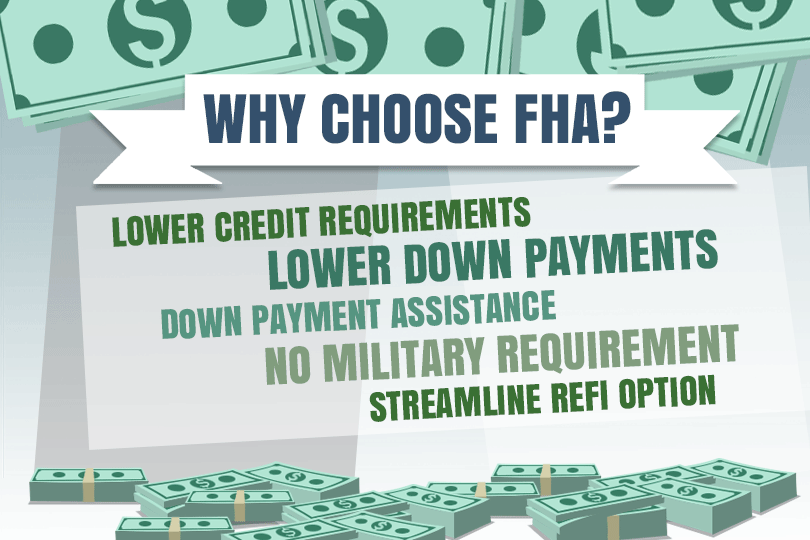Benefits of an FHA Loan
July 14, 2021
One option for financing your home is an FHA loan. These mortgages are insured by the Federal Housing Administration (FHA), a government agency committed to stimulating the American housing market, and create ways for people of all income levels to gain access to safe and affordable housing.
In addition to offering competitive interest rates, there are a number of reasons why FHA loans are one of the most popular loan types of mortgages for many first-time homebuyers as well as repeat buyers with lower credit scores.
Flexible Down Payment and Credit Score Requirements
FHA loans are designed with first-time homebuyers in mind; younger borrowers who haven’t achieved a high credit score yet, and probably don’t have enough savings for a large down payment. With this in mind, the FHA requires a down payment as low as 3.5% combined with a credit score of 580 or more to qualify for home loans, which is quite lower than the 620 minimum score and 20% down payment that is typically required by conventional lenders.
In the case of borrowers with even lower scores, the FHA allows a minimum score of 500 if the applicant can put up 10% toward the down payment. This is especially beneficial for borrowers who have suffered bankruptcy or foreclosure, which would preclude them from qualifying for conventional home loans.
More Housing Options
The FHA’s aim is to expand housing opportunities for Americans, which is why FHA loans are suitable to finance various different property types. FHA loans can be used to buy single-family homes, multi-family homes with up to four units, manufactured homes on permanent foundations, and even condominiums.
Open to All Income Levels
While conventional lenders can have set income limits to qualify for loans, there is no minimum or maximum income limit for FHA loans. Borrowers do not need a qualifying income, but they must show proof of employment, have at least two established credit accounts.
Cheaper Mortgage Insurance
Many conventional lenders charge expensive Private Mortgage Insurance to borrowers with lower than necessary credit scores who cannot afford a 20% down payment. You can avoid this higher cost with an FHA loan, which requires the same Mortgage Insurance Premium, regardless of your credit score.
Gift Funds Are Permitted
Even with a low, down payment requirement, the FHA allows the money to be sourced with “gifts,” which are funds not earned directly by the borrowers. This can include money from friends, family, a charity, employers, unions, or state and local government agencies, as long as the gifts are verified in writing by the donor.
Non-Occupying Co-Signers
This is another advantage for first-time homebuyers with insufficient credit histories. While there are some restrictions, the FHA loans allow applicants to have a co-signer on the loan who does not plan to live on the property. This can be someone (such as a parent) with more established creditworthiness whose income and assets can be used to support the loan.
The FHA loan has many features that appeal to a vast number of borrowers, but it’s best to consider all your options. Read up on the different mortgage types, and talk to your loan officer to see what the best move is for you!
------------------------------
RELATED VIDEOS:
Understand the Reasons for Private Mortgage Insurance
Carefully Read Your Closing Disclosure
Buying a Home With a Co-Borrower

FHA Loan Articles
September 13, 2023FHA rehab loans are a specialized type of mortgage loan offered by the Federal Housing Administration that allows borrowers to finance both the purchase or refinance of a home and the cost of needed repairs.
September 8, 2023Borrowers considering an FHA loan should be familiar with some basic loan terminology. These loans are popular among first-time homebuyers and those with lower credit scores because they often offer more flexible eligibility requirements and lower down payment options.
September 2, 2023You may have heard the terms co-borrower and cosigner in connection with your FHA loan process, but aren't sure about the distinction. Both a co-borrower and a cosigner can help a primary borrower qualify for a mortgage, but they have different roles and responsibilities.
August 27, 2023The Federal Housing Administration has specific credit requirements and guidelines for borrowers looking to buy or refinance homes with an FHA loan. In addition to what FHA guidelines state, lenders may have more stringent requirements that may vary from one lender to another.
August 23, 2023Mortgage APR (Annual Percentage Rate) and a loan's interest rate are two different things, although they are closely related. Understanding the difference is an important part of a borrower's analysis of the true cost of their mortgage.







